专题讲解冠词课件(14张PPT)
图片预览
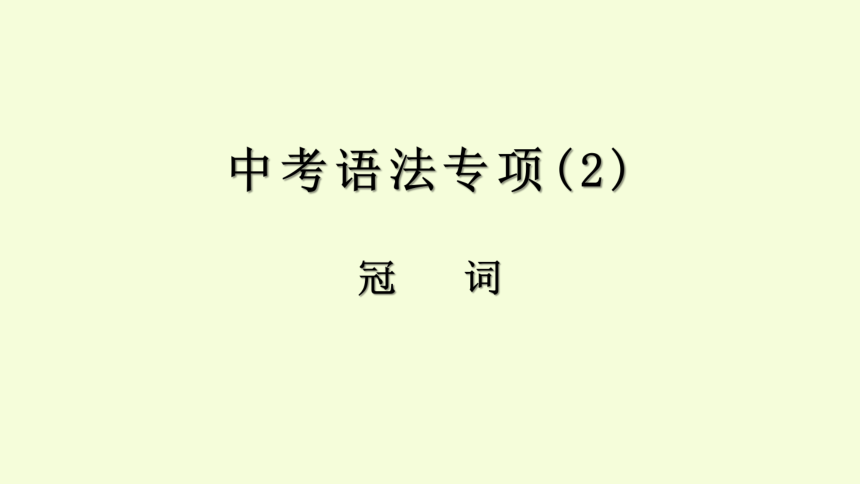
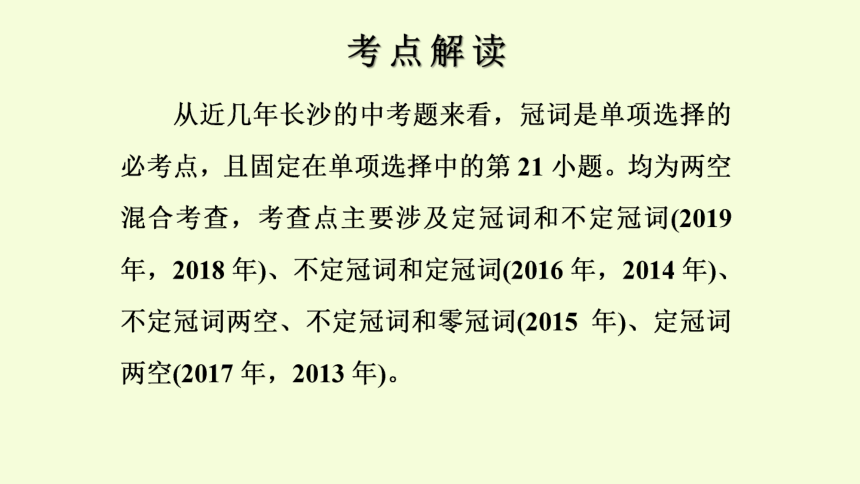
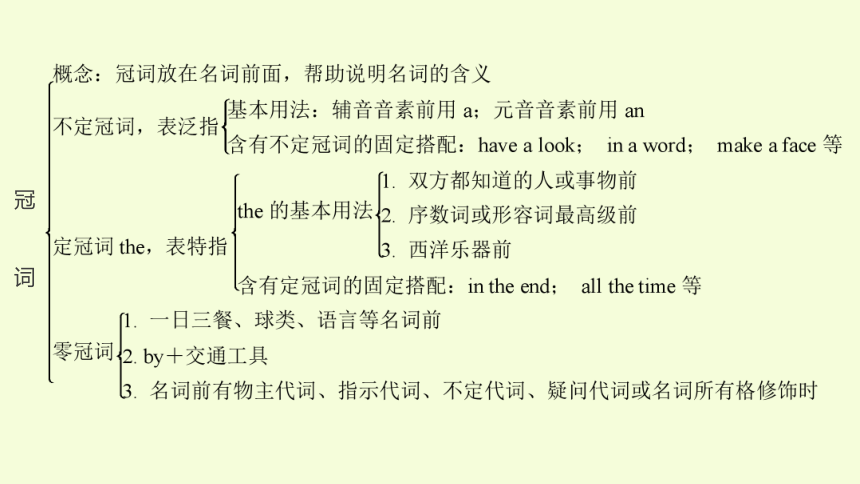
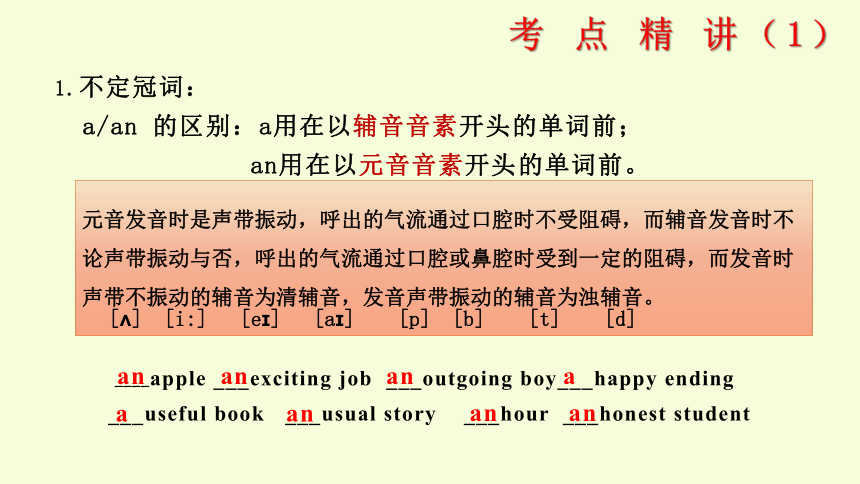
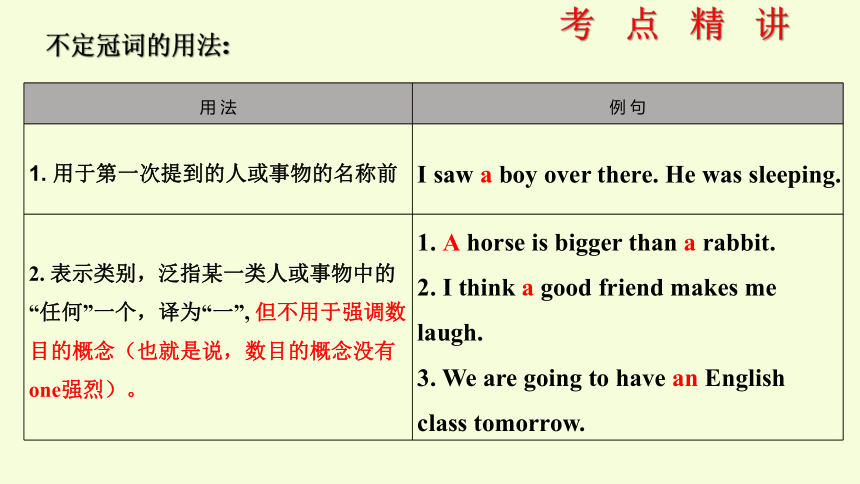
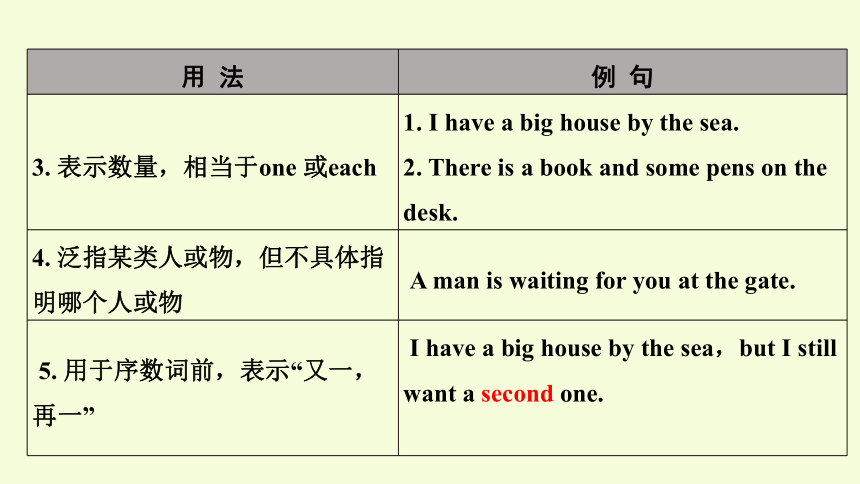
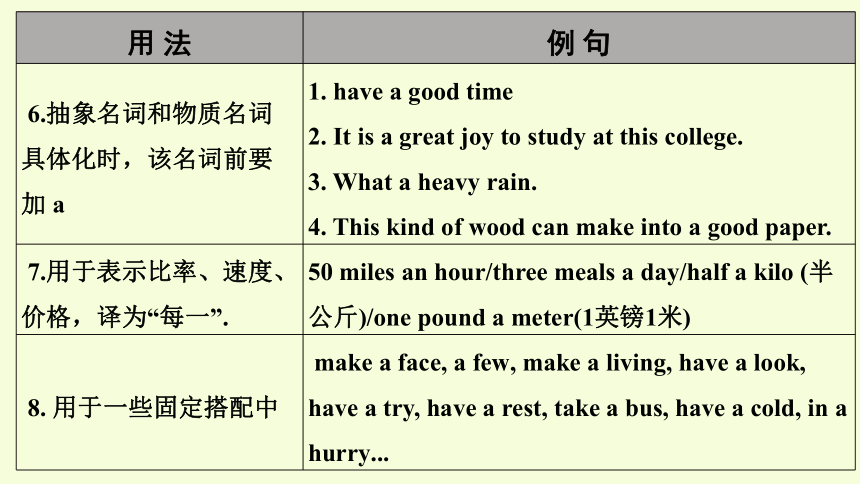
文档简介
(共14张PPT)
中考语法专项(2)
冠 词
考点解读
冠
词
1.不定冠词:
a/an 的区别:a用在以辅音音素开头的单词前;
an用在以元音音素开头的单词前。
____apple ___exciting job ___outgoing boy___happy ending
___useful book ___usual story ___hour ___honest student
元音发音时是声带振动,呼出的气流通过口腔时不受阻碍,而辅音发音时不论声带振动与否,呼出的气流通过口腔或鼻腔时受到一定的阻碍,而发音时声带不振动的辅音为清辅音,发音声带振动的辅音为浊辅音。
[ ] [i:] [e ] [a ] [p] [b] [t] [d]
考 点 精 讲(1)
an
an
an
a
a
an
an
an
考 点 精 讲
不定冠词的用法:
用 法 例 句
1. 用于第一次提到的人或事物的名称前 I saw a boy over there. He was sleeping.
2. 表示类别,泛指某一类人或事物中的“任何”一个,译为“一”, 但不用于强调数目的概念(也就是说,数目的概念没有one强烈)。 1. A horse is bigger than a rabbit.
2. I think a good friend makes me laugh.
3. We are going to have an English class tomorrow.
用 法 例 句
3. 表示数量,相当于one 或each 1. I have a big house by the sea.
2. There is a book and some pens on the desk.
4. 泛指某类人或物,但不具体指明哪个人或物 A man is waiting for you at the gate.
5. 用于序数词前,表示“又一,再一” I have a big house by the sea,but I still want a second one.
用 法 例 句
6.抽象名词和物质名词具体化时,该名词前要加 a 1. have a good time
2. It is a great joy to study at this college.
3. What a heavy rain.
4. This kind of wood can make into a good paper.
7.用于表示比率、速度、价格,译为“每一”. 50 miles an hour/three meals a day/half a kilo (半公斤)/one pound a meter(1英镑1米)
8. 用于一些固定搭配中 make a face, a few, make a living, have a look, have a try, have a rest, take a bus, have a cold, in a hurry...
考 点 精 讲(2)
定冠词的用法:
用 法 示 例
1. 用在特指说话人和听话人都 清楚的人或事物前 Give me the pen, please.
Pass me the salt. Take the medicine.
2.用于上文已提过或谈话双方都知道的人或事物前 I have a big house by the sea. The house is made of glass.
用 法 示 例
3. 用在世界上独一无二的事物或表示自然现象的名词前。 The earth is a planet and it goes around the sun.
4. 用在单数可数名词前表示一类人或事物。 The panda is one of the animals in danger.
5. 用于姓氏复数前表示一家人或夫妻 The Whites are going to have a picnic tomorrow.
用 法 示 例
6. 用于形容词前表示一类人或物 the rich/poor/blind/old/young
7. 用在表示方位/地点/时间的名词前 in the east/west/south/north of
in the morning / afternoon / evening
用在序数词前或形容词最高级前(副词最高级前可以省略)
若有形容词性的物主代词修饰时,则不用。
1. The first prize is only the book called Around the World in 80Days!
2. The most unforgettable person in my life is my classmate,Lucy.
This is my first time to visit France.
用 法 示 例
9. 用在西洋乐器名称前 play the piano/guitar/violin
用在专有名词前
11.用在由短语或从句修饰的,表示特指的名词前。 the Great Wall
the Summer Palace
The boy on the playground is my best friend.
Do you know the woman standing at the gate of the school
12. 常见的固定搭配
at the same time 同时 all the time一直
on the other hand另一方面
in the end最后 in the past在过去
in the dark在黑暗中 in the distance在远处
考 点 精 讲(3)
零冠词
用 法 示 例
1.在一日三餐、球类、语言、学科、棋类、游戏类名词前 have breakfast, play football,
learn English , play chess
2.在与by连用的交通工具名称前 by train/ by bus
3.人名、地名、街道名、城市名、洲、省、机场、节日等专有名词前 Fuyuan Road /Huanghua Airport
Teachers’Day /Hubei Province
用 法 示 例
4. 季节、月份、星期前 in summer /in January /on Sunday
5. 名词前有物主代词、指示代词、不定代词、疑问代词或名词所有格修饰时 my son/ this book /Jack’s bike /some water
6. 职位、头衔、称呼前 Who is more handsome, Mr.Li or Mr. Zhang
7. 固定搭配
at home / in time/ in danger/
by mistake/have fun /face to face
有无定冠词的区别:
1. at the table 在桌子旁 at table 吃饭
They were at table when I entered.
She sat at the table with pen and paper.
2. at/in the school在学校里/在学校内任职 at/in school 在学校/在上课/在求学
Students often learn something in school.
He teaches English in the school.
3. by the sea 在海边 by sea 乘船
4. go to the school 到学校去(谁都可以去) go to school 去上学
5. in the class 在班里 in class 在课堂上
6. in the front of 在...前面(内部) in front of 在...前面 (外部)
7. in the hospital 在医院里 in hospital 住院
考 点 精 讲(4)
中考语法专项(2)
冠 词
考点解读
冠
词
1.不定冠词:
a/an 的区别:a用在以辅音音素开头的单词前;
an用在以元音音素开头的单词前。
____apple ___exciting job ___outgoing boy___happy ending
___useful book ___usual story ___hour ___honest student
元音发音时是声带振动,呼出的气流通过口腔时不受阻碍,而辅音发音时不论声带振动与否,呼出的气流通过口腔或鼻腔时受到一定的阻碍,而发音时声带不振动的辅音为清辅音,发音声带振动的辅音为浊辅音。
[ ] [i:] [e ] [a ] [p] [b] [t] [d]
考 点 精 讲(1)
an
an
an
a
a
an
an
an
考 点 精 讲
不定冠词的用法:
用 法 例 句
1. 用于第一次提到的人或事物的名称前 I saw a boy over there. He was sleeping.
2. 表示类别,泛指某一类人或事物中的“任何”一个,译为“一”, 但不用于强调数目的概念(也就是说,数目的概念没有one强烈)。 1. A horse is bigger than a rabbit.
2. I think a good friend makes me laugh.
3. We are going to have an English class tomorrow.
用 法 例 句
3. 表示数量,相当于one 或each 1. I have a big house by the sea.
2. There is a book and some pens on the desk.
4. 泛指某类人或物,但不具体指明哪个人或物 A man is waiting for you at the gate.
5. 用于序数词前,表示“又一,再一” I have a big house by the sea,but I still want a second one.
用 法 例 句
6.抽象名词和物质名词具体化时,该名词前要加 a 1. have a good time
2. It is a great joy to study at this college.
3. What a heavy rain.
4. This kind of wood can make into a good paper.
7.用于表示比率、速度、价格,译为“每一”. 50 miles an hour/three meals a day/half a kilo (半公斤)/one pound a meter(1英镑1米)
8. 用于一些固定搭配中 make a face, a few, make a living, have a look, have a try, have a rest, take a bus, have a cold, in a hurry...
考 点 精 讲(2)
定冠词的用法:
用 法 示 例
1. 用在特指说话人和听话人都 清楚的人或事物前 Give me the pen, please.
Pass me the salt. Take the medicine.
2.用于上文已提过或谈话双方都知道的人或事物前 I have a big house by the sea. The house is made of glass.
用 法 示 例
3. 用在世界上独一无二的事物或表示自然现象的名词前。 The earth is a planet and it goes around the sun.
4. 用在单数可数名词前表示一类人或事物。 The panda is one of the animals in danger.
5. 用于姓氏复数前表示一家人或夫妻 The Whites are going to have a picnic tomorrow.
用 法 示 例
6. 用于形容词前表示一类人或物 the rich/poor/blind/old/young
7. 用在表示方位/地点/时间的名词前 in the east/west/south/north of
in the morning / afternoon / evening
用在序数词前或形容词最高级前(副词最高级前可以省略)
若有形容词性的物主代词修饰时,则不用。
1. The first prize is only the book called Around the World in 80Days!
2. The most unforgettable person in my life is my classmate,Lucy.
This is my first time to visit France.
用 法 示 例
9. 用在西洋乐器名称前 play the piano/guitar/violin
用在专有名词前
11.用在由短语或从句修饰的,表示特指的名词前。 the Great Wall
the Summer Palace
The boy on the playground is my best friend.
Do you know the woman standing at the gate of the school
12. 常见的固定搭配
at the same time 同时 all the time一直
on the other hand另一方面
in the end最后 in the past在过去
in the dark在黑暗中 in the distance在远处
考 点 精 讲(3)
零冠词
用 法 示 例
1.在一日三餐、球类、语言、学科、棋类、游戏类名词前 have breakfast, play football,
learn English , play chess
2.在与by连用的交通工具名称前 by train/ by bus
3.人名、地名、街道名、城市名、洲、省、机场、节日等专有名词前 Fuyuan Road /Huanghua Airport
Teachers’Day /Hubei Province
用 法 示 例
4. 季节、月份、星期前 in summer /in January /on Sunday
5. 名词前有物主代词、指示代词、不定代词、疑问代词或名词所有格修饰时 my son/ this book /Jack’s bike /some water
6. 职位、头衔、称呼前 Who is more handsome, Mr.Li or Mr. Zhang
7. 固定搭配
at home / in time/ in danger/
by mistake/have fun /face to face
有无定冠词的区别:
1. at the table 在桌子旁 at table 吃饭
They were at table when I entered.
She sat at the table with pen and paper.
2. at/in the school在学校里/在学校内任职 at/in school 在学校/在上课/在求学
Students often learn something in school.
He teaches English in the school.
3. by the sea 在海边 by sea 乘船
4. go to the school 到学校去(谁都可以去) go to school 去上学
5. in the class 在班里 in class 在课堂上
6. in the front of 在...前面(内部) in front of 在...前面 (外部)
7. in the hospital 在医院里 in hospital 住院
考 点 精 讲(4)
同课章节目录
- 词法
- 名词
- 动词和动词短语
- 动词语态
- 动词时态
- 助动词和情态动词
- 非谓语动词
- 冠词
- 代词
- 数词和量词
- 形容词副词及其比较等级
- 介词和介词短语
- 连词和感叹词
- 构词法
- 相似、相近词比较
- 句法
- 陈述句
- 一般疑问句和否定疑问句
- 特殊疑问句及选择疑问句
- 反意疑问句
- 存在句(There be句型)
- 宾语从句
- 定语从句
- 状语从句
- 主谓一致问题
- 简单句
- 并列句
- 复合句
- 主谓一致
- 主、表语从句
- 名词性从句
- 直接引语和间接引语
- 虚拟语气
- 感叹句
- 强调句
- 倒装句
- 祈使句
- 句子的成分
- 句子的分类
- 题型专区
- 单项选择部分
- 易错题
- 完形填空
- 阅读理解
- 词汇练习
- 听说训练
- 句型转换
- 补全对话
- 短文改错
- 翻译
- 书面表达
- 任务型阅读
- 语法填空
- 其他资料
